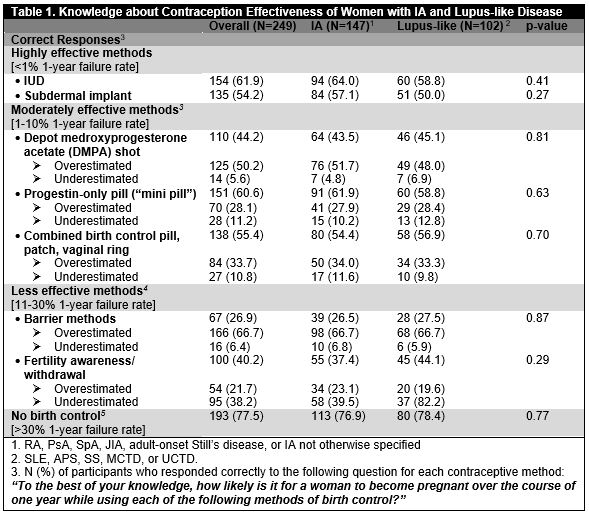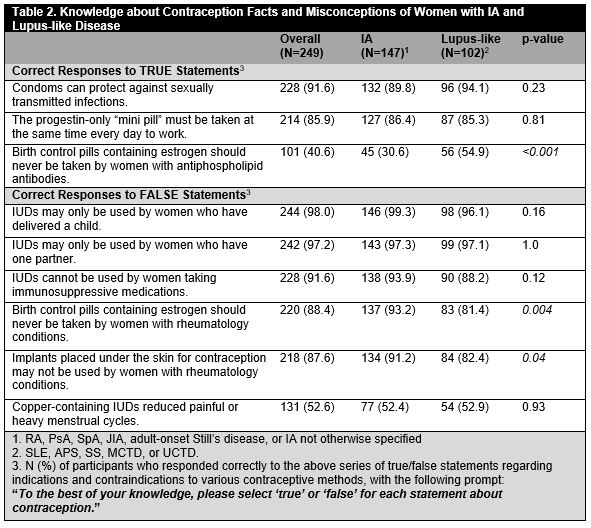Session Information
Date: Sunday, November 12, 2023
Title: (0460–0479) Reproductive Issues in Rheumatic Disorders Poster I
Session Type: Poster Session A
Session Time: 9:00AM-11:00AM
Background/Purpose: Rheumatologists do not consistently provide contraceptive counseling for patients with systemic rheumatic disease (SRD). As contraception considerations may differ based on SRD, we compared contraception knowledge between individuals with reproductive capacity who have inflammatory arthritis (IA) or lupus-like diseases.
Methods: Women aged 18-65 years seen by a rheumatologist at our academic center ≥2 times from 2020-2022 were enrolled in the Rheumatology Women’s Reproductive Health and Wellness Cohort. This analysis included participants who completed a contraception knowledge assessment and self-reported IA or lupus-like disease. We excluded participants >50 years of age and those who self-reported menopause/premature ovarian failure, hysterectomy and/or oophorectomy, and/or infertility. We used descriptive statistics to compare the frequency of correct responses between participants with IA and lupus-like diseases.
Results: Of 812 cohort participants, 658 (81.0%) responded to contraception questions; 249 with reproductive capacity (mean age 36.3 ± 7.5 years; 99.2% self-reporting woman as gender identity) who self-reported IA (n=147) or lupus-like disease (n=102) were included in this analysis. Patients with IA vs. lupus-like diseases were more frequently White race (82.5% vs. 69.7%, p=0.04) and less frequently Hispanic/Latinx ethnicity (7.5% vs. 15.7%, p=0.04). 93.2% reported Bachelor’s degree or higher education level and 61.1% were married/partnered, with no differences between groups.
There were no differences in the frequency of correct responses about contraception effectiveness between patients with IA and lupus-like disease. Many participants overestimated the effectiveness of methods with low (1-10%) 1-year failure rates: 50.2% for depot medroxyprogesterone acetate [DMPA], 33.7% for estrogen-containing birth control pill [BCP], patch, or vaginal ring, and 28.1% for the progestin-only pill. In terms of methods with high (11-30%) 1-year failure rates, 66.7% overestimated effectiveness of barrier methods [Table 1].
Compared to individuals with IA, those with lupus-like disease more frequently responded “true” (i.e., correct response) that BCPs are contraindicated for women with antiphospholipid antibodies (aPL) (54.9% vs. 30.6%, p< 0.001). Participants with lupus-like disease vs. those with IA less frequently responded “false” (i.e., correct response) that BCPs (81.4% vs. 93.2%, p=0.004) and subdermal implants (82.4% vs. 91.2%, p=0.04) are contraindicated for women with any rheumatic disease [Table 2].
Conclusion: In a sample of highly educated individuals with reproductive capacity and IA or lupus-like disease, approximately half responded incorrectly about effectiveness of moderately/highly effective contraceptive methods. Compared to those with IA, more patients with lupus-like disease endorsed SRD-specific contraindications to BCPs: half correctly noted BCPs should not be taken by patients with aPL but one-fifth incorrectly noted BCPs should not be taken by anyone with SRD. Our results highlight important misconceptions about contraception that can inform patient education and counseling efforts.
To cite this abstract in AMA style:
Siegel C, Barbhaiya M, Masto L, Smole A, Stamm B, Levine J, Lieber S, Mandl L, Lockshin M, Sammaritano L. Knowledge and Misconceptions About Contraception Among Individuals with Inflammatory Arthritis and Lupus-like Diseases [abstract]. Arthritis Rheumatol. 2023; 75 (suppl 9). https://acrabstracts.org/abstract/knowledge-and-misconceptions-about-contraception-among-individuals-with-inflammatory-arthritis-and-lupus-like-diseases/. Accessed .« Back to ACR Convergence 2023
ACR Meeting Abstracts - https://acrabstracts.org/abstract/knowledge-and-misconceptions-about-contraception-among-individuals-with-inflammatory-arthritis-and-lupus-like-diseases/


